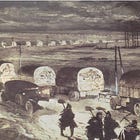Funeral Details
A decision-forcing case
The article that follows provides the materials for a decision-forcing case, an exercise in which participants take on the role of a leader who, at some time in the past, found himself faced with a difficult decision. For more about decision-forcing cases, see:
Today is Tuesday, 2 August 1966.
You are Wallace M. Greene, an officer of the United States Marine Corps. You currently serve, in the rank of general, as the commandant of the Marine Corps.
The other services of the US Armed Forces - the Army, Navy, and Air Force - might well be described as oligarchies. That is, the senior man, whether styled “chief of staff” or “chief of naval operations,” presides over a council composed of several other four-star officers. The Marine Corps, however, resembles a monarchy. Thus, the commandant bears full responsibility, not only to Congress and the American people, but to all Marines who are, were, and ever will be, for the efficiency, discipline, and reputation of the organization.
At present, your chief concern has been the expansion of the Marine Corps to meet the needs of the war in Vietnam. On 1 January 1964, the day you reported for duty as commandant, some 189,600 Marines were serving on active duty. Over the course of the past thirty-one months, that number has increased to 261,700. Current plans, moreover, call for further growth. Thus, by the end of September of 1967, you expect to lead a force of 285,000 men and women, few of whom have celebrated their twenty-third birthdays.
A few moments ago, your senior enlisted advisor, Sergeant Major of the Marine Corps Herbert J. Sweet, brought a problem to your attention.
“General, have you seen the news? About Charles Whitman, the sniper who killed all those people in Texas?”
“Yes, Sergeant Major. It’s terrible. A few minutes ago, I read that he shot forty-five people, thirty-one of whom died. I also read that, if those two police officers had not killed him, he had enough in the way of guns and ammo to shoot many more.”
“It’s even worse than that. I just discovered that Whitman was an honorably discharged Marine. As such, he rates a full military funeral, with a flag on the casket, pall-bearers in uniform, and a firing party, as well as burial in a national military cemetery.”
General Wallace M. Greene, commandant of the Marine Corps, what do you do?
If you would like to play an active part in this exercise, please use the comments section to describe the actions that General Greene should take in response to this situation. In doing so, please take care to refrain from “spoiling the story” with information about events that took place after 2 August 1966. (Please note that the Wikipedia article about Charles Whitman contains both spoilers and, where this matter is concerned, erroneous information.)
To Share, Support, or Subscribe:






This is an interesting one!
My answer is to cut the baby in half. He completed his term of service, with honour, and we don't abandon our own. IF his next of kin request a military funeral, he gets the flag on the coffin and uniformed pallbearers, but no firing party.
Thus his prior service to country (flag) and comrades (pallbearers) is given due regard, but the man himself doesn't get the final mark of respect (to say nothing of how inappropriate that mark would be in the circumstances).
When the press ask, the answer is "THAT's how special it is to have been one of us."
Would a convicted Felon lose his/her rights? That’s my first question. Failing that, my recommendation is to conduct the funeral, with honors, in private. Thus, the minimum required to uphold what an honorably discharged veteran has earned.